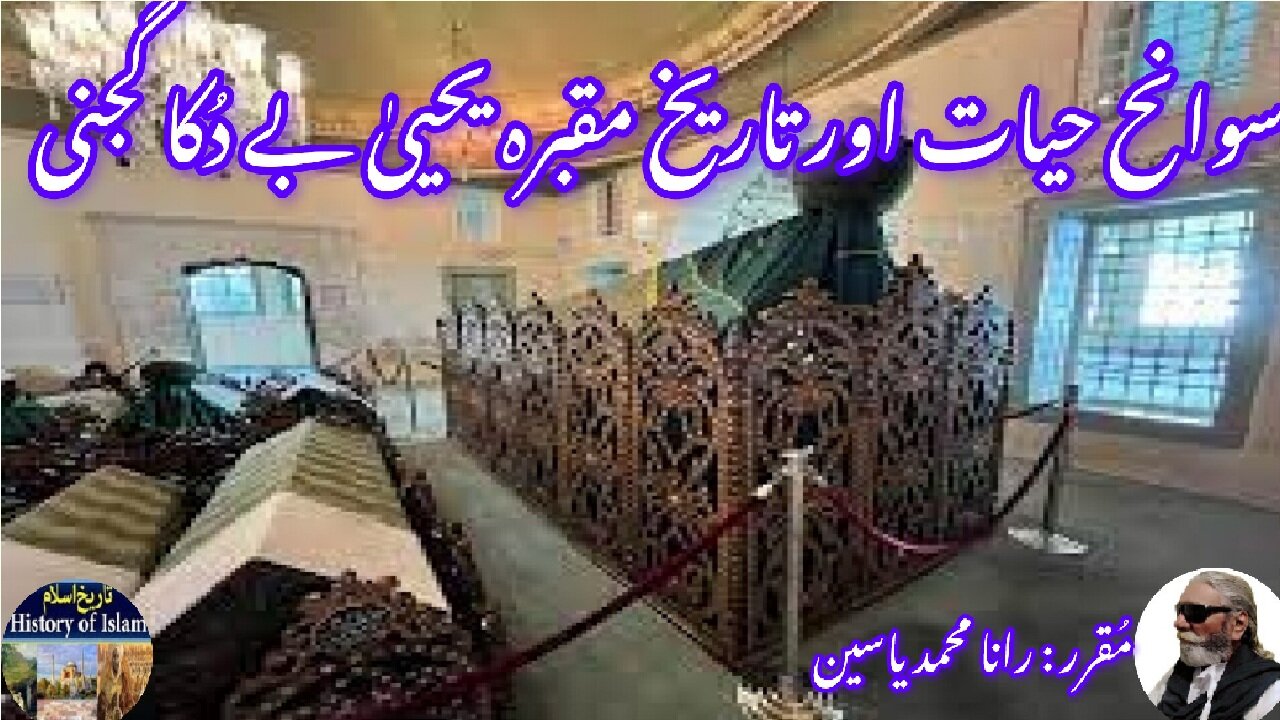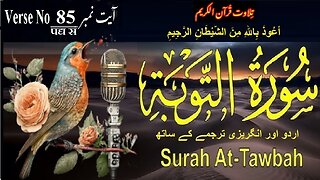Premium Only Content

Yahya bay Dukagjini and history of his shrine یحییٰ بے دکاگجنی کی سوانح حیات اور مزار کی تاریخ
@islamichistory813 #sufisaint #cultural #heritage #biography #islamic #mysticism #islamic #philosophy #shrine #historical #figures
Biography of Yahya bey Dukagjini and the history of his shrine
Dekhti Aankhooon aur sountay kaanoon ko Asslamoalaikum, sisters, brothers friends and elders, in informative series videos of Islamic ascolars, sufisaints, cultural heritages, islamic philosophys, islamic mysticisms and historical figures. today we are describing biography of Yahya bey Dukagjini and the history of his shrine.
Yahya Bey was brought to Istanbul as part of the Dev?irme, an Ottoman institution of forcible recruitment through which non-Muslim boys were selected by Imperial authorities, taken from their families, converted to Islam, and then entered into Imperial service. Yahya Bey therefore moved to Istanbul at an early age. He originally trained to be an archer, but eventually impressed Kemalpa?azade (?eyh-ül-?slam and author of the Tevarih-i Âl-Osman) with a kaside he had written. He thus began his path through Imperial educational structures and into the bureaucracy. He was known as a sâhib-i seyf ü kalem, or master of the sword and pen, meaning a man who was both a warrior and a poet. Apart from his prolific poetical oeuvre, which we’ll see below, he was also a respected soldier, participating in the Battle of Çald?ran in 1514, the Ottoman-Mamluk War in 1516-17 CE, and even the Siege of Szigetvár in 1566 CE. But luck could be fickle for Ottoman civil servants and warriors. When Yahya Bey wrote a poem elegizing Kanunî Süleyman's first-born, ?ehzade Mustafa, Grand Vizier Rüstem Pa?a, Mustafa’s murderer, lashed out at the poet. When the dust settled, Yahya Bey was exiled to the Balkans. Some say that he took up residence in Zvornik, in present-day Bosnia and Hercegovina. Others claim that he actually spent his final days in Timi?oara/Temesvár, Romania. Wherever it might have been that Yahya Bey lived in exile, it was there that he eventually died at some point between 1575 and 1582 CE
Yahya Bey is well-represented within the Library’s holdings in part because of the high esteem in which he was held by contemporary literati and soldiers as well as by future generations of scholars. Even while in exile, he impressed the Ottoman soldier, poet and historian Mustafa Ali, then stationed in Bosnia, who was later inspired by Yahya’s story in writing his own poetic works. In the late 19th and early 20th centuries, his popularity was encouraged by the English Orientalist E. J. W. Gibb , a prolific collector of West Asian manuscripts and a giant in Anglophone Ottoman Studies. The full impact of his and other British Orientalists’ collecting and analytical practices has been succinctly reviewed by Dr. Nagihan Gür in a number of her published papers. Gibb claimed that Yahya Bey was a particularly creative and innovative poet, borrowing and adapting themes and styles from Persian poetry. He further elevated the poet for his mastery of Istanbulite Ottoman Turkish, claiming that it was not possible to find any hint of Yahya’s Albanian origins in his use of the Ottoman language. As Gibb’s six-volume A History of Ottoman Poetry became a staple of literary criticism for the Anglophone world in the 20th century, so too would Yahya Bey find a place within the Orientalist pantheon of Ottoman poets established by European and American scholars.
The story of Ottoman Dukagjinis and the British Library’s Ottoman manuscripts does not end with Yahya Bey. Nor, apparently, did the story of the Dukaginzadeler in the Ottoman bureaucracy. Or 7466 is a mün?eat of the late 16th-century Ottoman poet Veysi, which was purchased from I. E. Gégou on 9 April 1910. A mün?eat is essentially a collection of letters and other texts that can be used as models for future correspondence. The genre is fairly common within our holdings. The general idea was popular in many cultures until fairly recently; I remember having a French correspondence manual in the 1990s as a supplementary text for high school and university French class. In this particular volume, we find a copy of a letter addressed to Dukaginzade Osman (died 1603 CE), Kad? of Cairo. While Dukaginzade was not nearly as well-known as his relatives, his name does appear in a number of different mün?eat held in various locations and penned by different authors. Most recently, he came up in the chapter “The law school of Mehmed II in the last quarter of the sixteenth century: a glass ceiling for the less connected Ottoman Ulema” by Dr. Baki Tezcan, found in Ottoman War and Peace. The British Library’s own holdings, then, would appear to mirror the broader fortunes of the Dukagjini family in the ebb and flow of the Ottoman Imperial order
Unlike many saints and scholars of the Islamic world, there is **no known shrine or mausoleum** dedicated to Yahya bey Dukagjini. His life, while illustrious as both soldier and poet, did not evoke large-scale veneration or murid-centered structures. Instead, his legacy lives on through his **divan poetry**, preserved in Ottoman Turkish manuscripts held in Istanbul, Aleppo, and the British Library—signifying his enduring literary and historical importance.
In summary, **Yahya bey Dukagjini represents a rare fusion of military valor and refined poetic craft within the Ottoman realm. Born in Ta?l?ca (modern Montenegro), he rose from dev?irme cadet to military commander and court poet. His bold elegy for ?ehzade Mustafa led to his exile, but also demonstrated his steadfast moral integrity. His literary output—especially the **diwan**, **Khamsa**, and epic mesnevi—remains a central contribution to classical Ottoman literature. Though his final resting place lacks a shrine, his work continues to resonate across centuries, reminding us of an Albanian?born poet who left a lasting mark on an imperial culture.
With this, we ask for your permission until tomorrow and pray to Allah Almighty to grant us the ability to act on the Quran and Hadith, Amen
Allah Hafiz
======================
-
 1:23
1:23
ISLAMIC HISTORY
3 hours agoSurah At Taubah Verse No 85 تلاوت َسورة اَلتَّوْبَة اردو اور انگریزی ترجمے کے ساتھ آیت نمبر
2 -
 LIVE
LIVE
SpartakusLIVE
5 hours agoEXPLOSIVE $400+ 2v2 Tuesday has viewers GLUED to the screen
453 watching -
 3:19:06
3:19:06
GrimmHollywood
4 hours ago🔴LIVE • GRIMM'S TUESDAY FRIGHT NIGHT • STARRING GRIMM HOLLYWOOD • NO, I'M NOT HUMAN PART 1 •
18.5K1 -
 1:21:01
1:21:01
Flyover Conservatives
11 hours agoAI Encouraged Suicide: The Global Experiment on Our Kids - Joe Allen | FOC Show
27.2K3 -
 1:07:40
1:07:40
Glenn Greenwald
6 hours agoTucker Carlson on Charlie Kirk Assassination Fallout, Free Speech, Foreign Policy, and the Reaction to his Kirk Remarks | SYSTEM UPDATE #520
164K108 -
 14:22
14:22
Robbi On The Record
2 days ago $0.66 earnedGen Z’s Narcissism Obsession: Why Everyone’s a “Psychologist”
28.4K11 -
 LIVE
LIVE
GritsGG
7 hours agoQuad Win Streaks!🫡 Most Wins in WORLD! 3600+
400 watching -
 1:09:28
1:09:28
Sarah Westall
4 hours agoCan the World Be This Strange? The Nature of Our Reality w/ Darius J Wright
32.7K2 -
 1:58:20
1:58:20
megimu32
4 hours agoOn The Subject: Friends | 31 Years of the Sitcom That Defined a Generation
33K5 -
 30:00
30:00
BEK TV
1 day agoCounter Culture Mom
8.44K